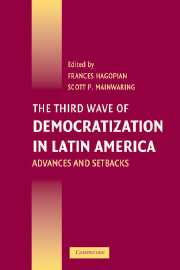Book contents
- Frontmatter
- Contents
- List of Figures
- List of Tables
- List of contributors
- Acknowledgments
- Introduction: The Third Wave of Democratization in Latin America
- 1 Latin American Democratization since 1978: Democratic Transitions, Breakdowns, and Erosions
- PART I THREE DEMOCRATIC GIANTS WITH AUTHORITARIAN PASTS: ARGENTINA, BRAZIL, AND MEXICO
- PART II UNEXPECTED DEMOCRACIES IN UNLIKELY COUNTRIES: BOLIVIA, EL SALVADOR, AND GUATEMALA
- PART III DEMOCRATIC EROSIONS IN THE THIRD WAVE: COLOMBIA, PERU, AND VENEZUELA
- 8 From “Restricted” to “Besieged”: The Changing Nature of the Limits to Democracy in Colombia
- 9 Peru 1980–2000: Chronicle of a Death Foretold? Determinism, Political Decisions, and Open Outcomes
- 10 Explaining Democratic Deterioration in Venezuela through Nested Inference
- PART IV Conclusions
- References
- Index
10 - Explaining Democratic Deterioration in Venezuela through Nested Inference
Published online by Cambridge University Press: 05 September 2012
- Frontmatter
- Contents
- List of Figures
- List of Tables
- List of contributors
- Acknowledgments
- Introduction: The Third Wave of Democratization in Latin America
- 1 Latin American Democratization since 1978: Democratic Transitions, Breakdowns, and Erosions
- PART I THREE DEMOCRATIC GIANTS WITH AUTHORITARIAN PASTS: ARGENTINA, BRAZIL, AND MEXICO
- PART II UNEXPECTED DEMOCRACIES IN UNLIKELY COUNTRIES: BOLIVIA, EL SALVADOR, AND GUATEMALA
- PART III DEMOCRATIC EROSIONS IN THE THIRD WAVE: COLOMBIA, PERU, AND VENEZUELA
- 8 From “Restricted” to “Besieged”: The Changing Nature of the Limits to Democracy in Colombia
- 9 Peru 1980–2000: Chronicle of a Death Foretold? Determinism, Political Decisions, and Open Outcomes
- 10 Explaining Democratic Deterioration in Venezuela through Nested Inference
- PART IV Conclusions
- References
- Index
Summary
From a Latin American perspective, Venezuela has often been a contrary case. It was one of the last major South American countries to give any kind of democracy a try (1946); democracy took firmer root in the early 1960s, just as authoritarian regimes were beginning to sweep most of South America; and it was reputed to be an old and well-established democracy by the time its neighbors underwent their democratic transitions in the late 1970s and early 1980s. During these periods, Venezuela was so out of step with its neighbors that it tended to be written off as an exceptional case. Its concerns were not on the regional research agenda, and the theories developed for other countries were assumed not to apply to Venezuela. In the 1990s, however, observers began to wonder whether Venezuela was a harbinger of its neighbors' political future. Violent repression in 1989, two coup attempts in 1992, and the rise of an antisystem president with authoritarian proclivities in 1998 presaged or coincided with setbacks in democracy in Peru, Guatemala, Paraguay, Ecuador, Colombia, and the Dominican Republic. Now we commonly assume that the influential theories do apply to Venezuela and that whatever explains Venezuela's crisis may be relevant for other countries. Venezuelan exceptionalism is over.
It is time, therefore, to reinsert Venezuela in the major theoretical debates. Here I do that by first examining how well general theories – not developed with Venezuela in mind – explain Venezuela's regime changes.
- Type
- Chapter
- Information
- The Third Wave of Democratization in Latin AmericaAdvances and Setbacks, pp. 289 - 316Publisher: Cambridge University PressPrint publication year: 2005
- 23
- Cited by

